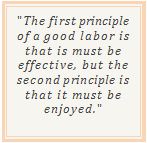 "The contribution that science can make to labor is to render it easier by the help of a tool or a process, and to assure the laborer of his perfect economic security while he is engaged upon it. Then it can be performed with leisure and enjoyment. But the modern laborer has not exactly received this benefit under the industrial regime. His labor is hard, its tempo is fierce, and his employment is insecure. The first principle of a good labor is that is must be effective, but the second principle is that it must be enjoyed. Labor is one of the largest items in the human career; it is a modest demand to ask that it may partake of happiness.
"The contribution that science can make to labor is to render it easier by the help of a tool or a process, and to assure the laborer of his perfect economic security while he is engaged upon it. Then it can be performed with leisure and enjoyment. But the modern laborer has not exactly received this benefit under the industrial regime. His labor is hard, its tempo is fierce, and his employment is insecure. The first principle of a good labor is that is must be effective, but the second principle is that it must be enjoyed. Labor is one of the largest items in the human career; it is a modest demand to ask that it may partake of happiness."The regular act of applied science is to introduce into labor a labor-saving device or a machine. Whether this is a benefit depends on how far it is advisable to save the labor. The philosophy of applied science is generally quite sure that the saving of labor is a pure gain, and that the more of it the better. This is to assume that labor is an evil, that only the end of labor or the material product is good. On this assumption labor becomes mercenary and servile, and it is no wonder if many forms of modern labor are accepted without resentment though they are evidently brutalizing. The act of labor as one of the happy functions of human life has been in effect abandoned, and is practiced solely for its rewards."
~an excerpt from I'll Take My Stand: The South and the Agrarian Tradition, pp. xl-xli.

No comments:
Post a Comment